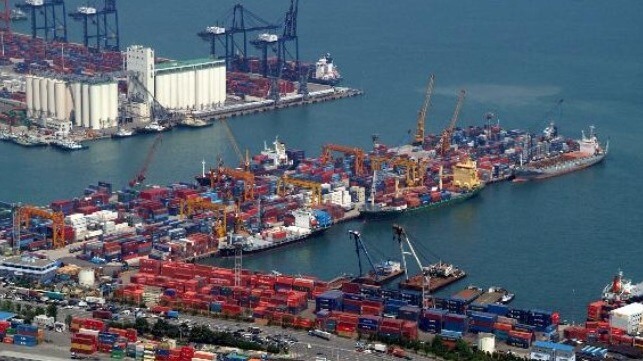
Published
Jun 10, 2022 7:34 PM by
The Maritime Executive
Ports in each Germany and South Korea had been impacted by strikes as staff reply to the growing pressures of worldwide inflation and two years of hardships through the pandemic. While the strike by port staff in Germany was not anticipated to final, however as a substitute was a “warning” by the union throughout protracted labor negotiations, a strike by truck drivers in South Korea is bringing port operations to a halt and rapidly impacting the most important industrial and manufacturing operations. All of this comes as consideration can also be centered on the labor negotiations for the U.S. West Coast longshore union.
The South Korean strike is being led by unionized truck drivers who actually have determined to take a seat down in the streets and cease their vans. The strike entered its fourth day on Friday intensifying. Estimates differ broadly on what number of truck drivers are concerned in the job motion with some experiences setting it as excessive as 20,000. Korea’s Transport Ministry stated as many as 7,500 drivers, which might be a few third of the Cargo Truckers union, had been anticipated to be on strike Friday. Official authorities estimates report that simply six p.c of the nation’s greater than 400,000 drivers are unionized, however observers are mentioning that the majority truck drivers are self-employed and even the non-union drivers are staying off the job fearing retribution from their colleagues.
In the face of skyrocketing gasoline costs, the drivers are demanding that minimal wage ensures launched two years in the past through the pandemic be prolonged past a December 31 expiration. They are additionally demanding work guidelines that stop overwork and prolonged hours that they are saying result in unsafe driving.
The strike is seen as a menace to the federal government of the newly elected president of South Korea, Yoon Suk-yeol. President Yoon took workplace simply final month and thus far has stated he prefers to remain out of the strike calling on the unions and administration to resolve their variations. Police, thus far, are solely intervening to cease legal exercise. As for Friday, they reported that there had been lower than 100 arrests throughout the nation.
Activity at South Korea’s main ports has come to a halt. Busan, which usually handles 80 p.c of the nation’s container visitors, reported that simply 5,400 TEU moved by means of the port. This was down by three-quarters from a typical day. Capacity on the port’s container yards is already down 5 p.c in May with port officers saying the yards had been almost three-quarters full earlier than the strike started.
Other ports throughout South Korea are reporting the same impression on operations. Ulsan, which is a significant industrial hub, suspended all operations on Tuesday. Incheon experiences that it’s working at about 20 p.c of regular capability.
Major industrial firms are additionally rapidly reporting shortages of supplies and an incapability to maneuver their items. Steel, auto, and cemetery factories suspended shipments, however Kia Motors with out automotive carriers is now struggling to search out storage for its automobiles. They requested the federal government to droop guidelines in order that they may transfer automobiles away from the manufacturing unit. As the strike is intensifying South Korea’s semiconductor trade is now reporting an incapability to obtain uncooked supplies elevating issues for semiconductors that are already in brief provide worldwide.
South Korea’s largest metal producer, POSCO additionally warned that it must delay shipments of metal and semi-finished merchandise. They are the main provider to South Korea’s shipyards with fears that the shortages will rapidly impression operations on the yards that had been already working at full manufacturing ranges to maintain up with orders.
Similarly, in Germany on Thursday the union representing dockworkers at Hamburg, Europe’s third busiest port, in addition to Bremerhaven, Wilhelmshaven, Bremen, and elsewhere staged a strike that they referred to as a warning to employers. Germany has not had a significant port strike in many years however as much as three-quarters of port workers are unionized. The union is demanding compensation for inflation with experiences saying their demand is for as a lot as a 14 p.c enhance over one 12 months whereas employers are providing seven p.c over two years.
Talks had been persevering with in Germany with the employees anticipated to stay on the job after the transient stoppage. German companies, nonetheless, level out that nearly the entire nation’s imports and exports transfer by means of the ports. Overland transport by rail and truck is proscribed.
In the United States, the longshore labor contract protecting the West Coast ports is because of expire in three weeks. The sides are reported to be far aside on problems with automation. Wages, after all, are a problem and there are additionally experiences that the terminals are actually proposing to increase morning gate hours to offer extra entry for truckers. Earlier this week a number of commerce associations referred to as on President Biden and the administration to be extra concerned in the negotiations. The National Retail Federation additionally referred to as on either side to remain on the desk and discuss warning of the results of additional disruptions to the U.S. provide chain.
